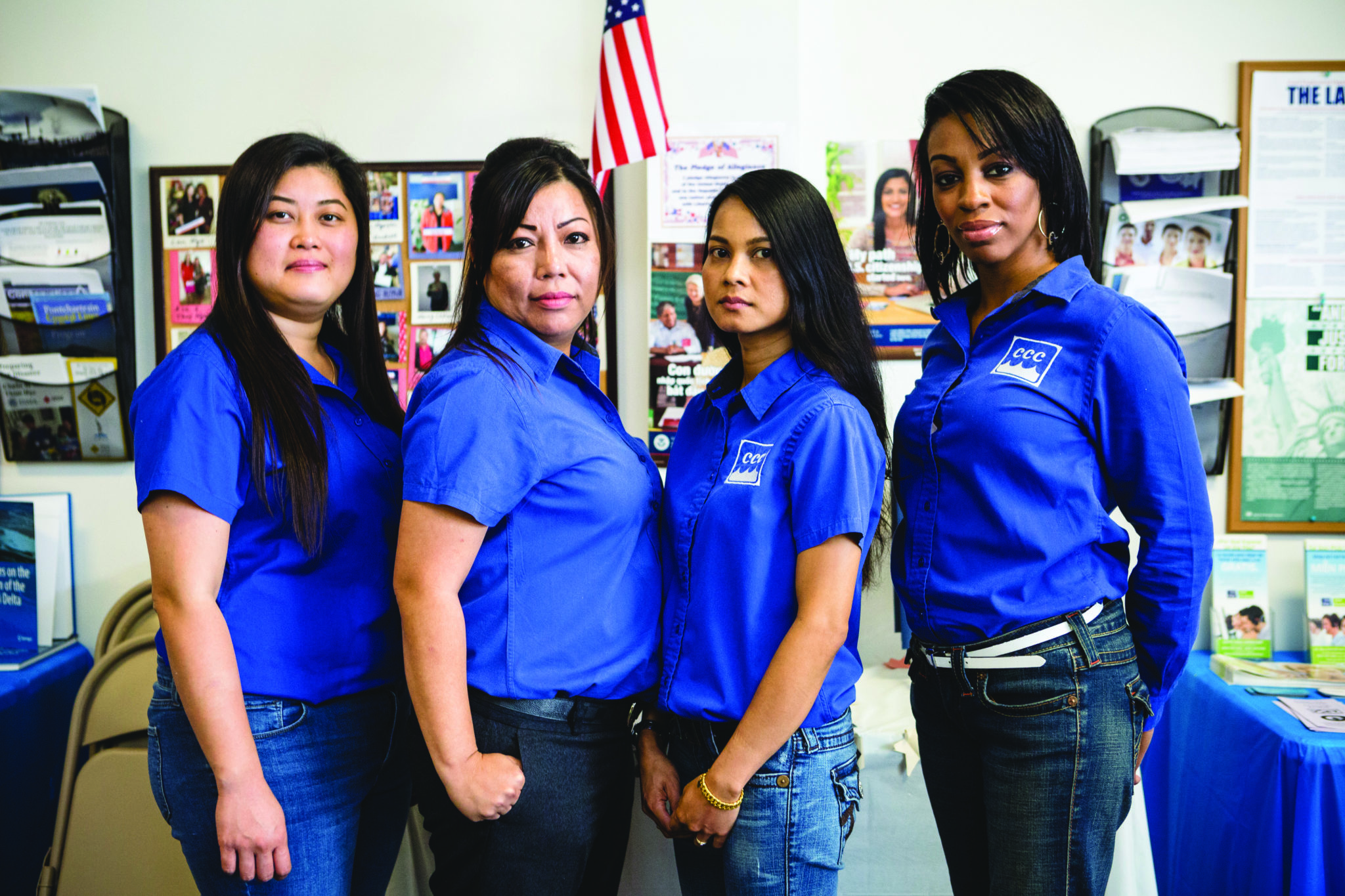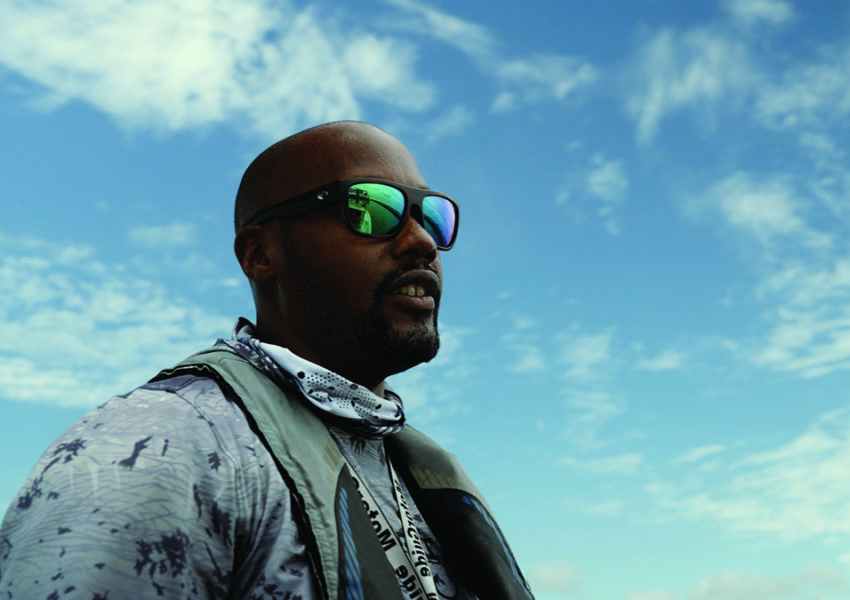An Industry's Heartbeat Louisiana’s Southeast Asian American fisherwomen foster a way of life
By Simi Kang
On a cool February morning, I arrived in Buras, Louisiana, a fishing town an hour and a half south of New Orleans, to learn about the trials of commercial shrimping in a post-Deepwater Horizon landscape. Sitting at the dining room table in his double-wide trailer, Phan Plork shared the highs and lows of twenty-plus years of shrimping: watching the land wash away, building two boats by hand, participating in the BP cleanup effort, and nurturing five children whom he discouraged from learning the trade.
![]()
He wanted them to attend college and develop skills on land, far from the day-to-day trials of hard labor, constant disaster, and regulatory changes. As he told story after story, Phan’s wife, Tal, nodded from the kitchen, adding detail and texture to his memories while she charred vegetables and split bones, starting a pho broth in a stock pot big enough to feed a congregation.
The Plorks are leaders in Buras’ Cambodian community. As elders at Trinity United Methodist Church, they provide food for gatherings, head fundraising efforts, and sing in the choir. While Phan spends much of his time on his primary boat, the Five Star, named in honor of their children, Tal volunteers at the church, looks after a handful of toddler-aged grandchildren, and, with her husband, organizes the area’s annual Cambodian New Year celebration.
As our conversation came to an end, Tal offered me a bottle of water and a piece of cake. Holding onto her husband’s shoulder and smiling down at him, she explained that it’s important to share these stories, both of triumph and struggle, to preserve knowledge for the next generation.

Vietnamese and Cambodian American fisherfolk make up almost forty percent of Louisiana’s shrimp fishery. Since being resettled in New Orleans East following the American evacuation of Saigon in 1975 or fleeing the Pol Pot regime in Cambodia, the state’s Southeast Asian and Southeast Asian American community has become central to the local economy. Much of the early capital for today’s Southeast Asian American–owned corner stores, dentist offices, restaurants, nail salons, and other small businesses was first generated on a boat.
From their earliest trips, whole families have labored on these boats. When a captain couldn’t afford a deckhand, his wife would jump on board, sorting shrimp and hauling nets alongside her husband. From their arrival to Louisiana’s Gulf Coast, Southeast Asian American women have occupied complex roles as caretakers, earners, and partners, providing the bedrock for a rich communal relationship to place and industry.

For the last two and a half years, I have worked with Sandy Nguyen at Coastal Communities Consulting, Inc. (CCC), the only nonprofit in southeast Louisiana devoted to helping commercial fishing businesses survive and thrive. Sandy has been my guide in my scholarship of the industry and region. As I followed her from office to dock, home to boat, to learn how her clients respond to changing environmental, economic, and political circumstances, it became clear that few others could do what Sandy does.
Today, fishermen struggle as shrimp grow smaller and fewer, foreign imports increase, and their community ages. Add more hurricanes, a disintegrating coastline, and regular oil spills, and the future looks bleak for fisherfolk and their families. For Southeast Asian and Southeast Asian American communities, language barriers and a reliance on informal economies further limit their access to support like disaster payouts and loans. Sandy’s knowledge of these plights comes not from her role at CCC, but through first-hand experiences as a fisherwoman. Boat owner, daughter, wife, and mother, she has made it her life’s work to maintain fishing families like hers.
Sandy is intimately familiar with the power of fisherfolk. Her family evacuated from Vietnam in 1979, fleeing to Malaysia on her father’s fishing boat. When Malaysian officials refused entry, Sandy’s father purposefully sank the boat just offshore. Under maritime law, he knew, the Malaysian government had to rescue his family of refugees from that capsized boat, no matter their nationality or asylum status. This resourceful mentality served him well in Louisiana. Relying on small loans from Southeast Asian refugees who resettled a few years earlier, he worked to buy his own boat. When he retired, he passed the boat on to Sandy’s husband, Mike.
That resourcefulness has served Sandy, too. Vowing to support her nuclear and extended family in whatever ways she could, Sandy spent her high school years studying the intricacies of fishery-specific regulations. Learning by doing, she made cold calls to state offices and did meticulous research to help her elders. In high school and college, she kept a mental calendar of filing dates for licenses and taxes, while developing new knowledge of citizenship applications and business accounting.
In ninth grade, Sandy began offering low-cost and free English language services to fellow refugees, helping them navigate licenses, deeds, and other complex paperwork. To this day, industry paperwork is not available in Khmer or Vietnamese.

Following Hurricanes Katrina and Rita in 2005, she recognized that her community needed sustained, targeted help. Leveraging skills she gained while earning a business degree at Tulane University, she stepped in after the Deepwater Horizon catastrophe of 2010 to help Southeast Asian fisherfolk receive compensation for the income they lost during the three-month shrimping season. Recognizing the depth of community need in the immediate aftermath of that accident—and the ensuing months of devastating underemployment, anxiety, and depression—she opened CCC’s doors in 2010. CCC’s staff, four women of color, offer ESL and citizenship classes, business support, and translation and interpretation services in Khmer and Vietnamese. They also promise a nuanced understanding of fisherfolks’ personal and economic struggles.
Today, Sandy calls herself the “second wife” of “her” fishermen. Putting thousands of miles on her sturdy truck each year, she spends time at shrimping docks, restaurants, community gardens, and family homes to share knowledge. Sandy also works with other nonprofit leaders, advocating for her clients at the state and federal level. She and the women of CCC are their most visible and accessible advocates in southeast Louisiana. CCC is the first place state officials and national press turn when they want to understand and address the industry.

As in most commercial fishing families, Southeast Asian and Southeast Asian American fishermen are the primary external earners. They cover mortgage payments and college tuition. They build family equity by reinvesting in their boats, from basic repairs to quick-freezing technology. While women raise children, keep the home, and nurture their family’s emotional health, they also do professional work as waitresses, nail technicians, office managers, and healthcare providers. Their income often covers utility bills and groceries.
You’ll seldom see a successful fisherman without a wife, because they are the true backbone of the industry.”
From the outside, it might look as though men address most of their families’ economic needs. Southeast Asian wives disrupt this easy equation. In addition to their full-time, year-round work in both familial and professional settings, almost all fisherwomen take on a third full-time job. Working beyond the boat, wives, sisters, and mothers maintain the heart of all family businesses: the finances.
To make sense of the role women play in southeast Louisiana’s commercial fishing industry, Sandy invited me to observe CCC’s annual tax exemption process.
I watched as couple after couple filtered through the office, finding seats among friends in one of two lines. The first led to a CCC staff member who would translate tax documents and help them file correctly; the second, to a representative of the Louisiana Department of Revenue, who would issue a sales tax exemption to defray the cost of repairing boats during the January to April off-season. As the women settled in for a long wait, they draped arms across chairs to chat and smacked their husbands conspiratorially on the back when they told a good joke. Every wife held a bulky file folder, filled with everything from trip tickets documenting daily catches to detailed family expenses. While men overwhelmingly did the work of fishing, these file folders revealed that women did a great deal behind the scenes to make that work possible.
This sort of accounting requires industry-specific knowledge, including seasonal openings and closures, licensure expiration dates, and broader regulatory shifts. Fisherwomen get this data directly from CCC. In addition to organizing meetings specifically for fisherwomen, CCC has run informal fishermen’s wives groups in Vietnamese and Khmer for several years. Sandy and her staff use the group to learn more about the women’s personal and professional aspirations, creating a space to share economic development opportunities. Around kitchen tables, they talk late into the night about grants and loans, identify skills the women would like to develop, and share news of potential off-the-water jobs. “You’ll seldom see a successful fisherman without a wife, because they are the true backbone of the industry,” Sandy said at the close of a recent meeting. “I’ve only seen a couple of commercial fishermen make it without a woman beside him.”

As entrepreneurs and matriarchs, Southeast Asian and Southeast Asian American fisherwomen secure the industry’s economic present and address its uncertain future. While answering the question, “How will I feed my family next year?” they focus intently on teaching their children to feed their own in the decades to come.
On a hot July evening, Sandy and I attended a Vietnamese-language meeting in Buras, where Phan and Tal Plork live and many of CCC’s clients dock their boats. The meeting was run by Louisiana’s Office of Community Development (OCD) and the Foundation for Louisiana (FFL). It was one of five scheduled in Buras to roll out Louisiana’s Strategic Adaptations for Future Environments (LA SAFE) initiative, meant to “create a community-focused resilience and adaptation policy framework.” By addressing rapid coastal land loss and resulting home and business flooding, LA SAFE hoped to identify how, given community-specific barriers to what the state calls resilience, Southeast Asian and Southeast Asian American coastal residents could secure a future along the coast.
I joined May Nguyen at one of fifteen crowded tables where fisherfolk and other residents ate fried rice and chè, a sweet pudding. A fierce community advocate who helps underserved Louisianians respond to disaster, coastal crisis, and state neglect through the Tulane Environmental Law Clinic, May translated as I took notes. While fishermen addressed business-related and infrastructural issues like repaving roads and replacing broken streetlights, fisherwomen eloquently identified broader community needs.
Advocating for healthcare facilities, community gardens, green spaces for recreation, ESL services, and education and job training initiatives, women drove the conversation. Their resilience left Sandy feeling optimistic. “You throw anything at our fisher[folk], they’ll take a minute, understand, and adjust. They’ll do what they need to make it work.” Glancing at me, she punctuated her statement with a quick elbow to my ribs and a smile. “You feel me?” I did.
Fishermen can feel the Gulf; anchoring their boats in place hours before they intend to begin fishing, captains and deckhands often nap, waking naturally as they intuit the tide changing and the shrimp coming in, ready to catch. Like their husbands, fisherwomen have learned the intricacies of the industry’s land-based economic and communal foundations. Refusing easy categories, Southeast Asian and Southeast Asian American wives, daughters, and elders write checks, memorize regulations, work second shifts, and care for their families. Through environmental and industry upheaval, their tireless care and knowledge promise a vibrant future for Louisiana, its coast, and its people.
Simi Kang is a scholar, artist, educator, and community advocate who engages Asian American collaborative resistance as a site for imagining ecologically and economically just futures. She is a Ph.D. Candidate in feminist studies at the University of Minnesota, Twin Cities.




